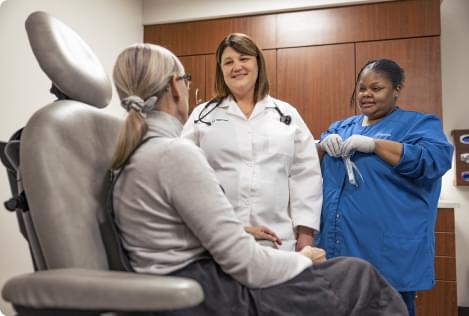| Study Name | Description | Trial Category | Trial SubCategory |
|---|---|---|---|
| EAY191-S3 ComboMATCH | The purpose of this study is to determine the effectiveness of Paclitaxel and Ipatasertib in patients who progressed within 6 months of taxane-based therapy. You must have a a AKT-Altered cancer. You must have a locally advanced, unresectable or metastatic cancer. | Cancer | Solid Tumors (non-breast) |
| ISPY 2 | This study uses the type of breast cancer you are diagnosed with to determine what treatment you are given. You must be diagnosed with stage 2 or stage 3 breast cancer. This study requires regular MRI's. | Cancer | Breast |
| NRG-GI008 | The purpose of this study to use blood draws looking at the tumor DNA in the blood to determine need for chemotherapy. You must be diagnosed with stage 3 colon cancer. | Cancer | Colon |
| NRG-GU009 | The purpose of this study is to determine if it is effective to use your genomic risk to determine the level of treatment you need. Those with a lower genomic risk get a de-intensified treatment and those with a higher risk get a intensified treatment. You must be diagnosed with high-risk prostate cancer. | Cancer | Prostate |
| NRG-GU010 | The purpose of this study is to determine if it is effective to use your genomic risk to determine the level of treatment you need. Those with a lower genomic risk get a de-intensified treatment and those with a higher risk get a intensified treatment. You must be diagnosed with unfavorable intermediate risk prostate cancer. | Cancer | Prostate |
| NRG-LU008 | The purpose of this study is to compare chemo and radiation followed by immunotherapy vs SBRT (stereotactic body radiation therapy) to primary tumor follwed by chemo and radiation then immunotherapy. You must be diagnosed with Stage 2 or 3 non-small cell lung cancer (NSCLC). | Cancer | Non-Small Cell Lung |
| S1803 | The purpose of this study is to compare daratumumab and lenalidomide vs lenalidomide alone for maintenance therapy after stem cell transplant. You must be diagnosed with multiple myeloma. | Cancer | Multiple Myeloma |
| S1900E (LUNGMAP sub study) | The purpose of this study is determine if the use of Sotorasib is effective in patients with previously treated stage 4 or recuurent KRAS G12C mutated non-squamous non-small cell lung cancer (NSCLC). You must be diagnosed with NSCLC with a KRAS G12C mutation. | Cancer | Metastatic Non-Small Cell Lung |
| S1914 | This study is comparing the use of Atezolizumab + SBRT (stereotactic body radiation therapy) vs SBRT Alone in high risk early stage non-small cell lung cancer (NSCLC). You must be diagnosed with stage 1 or 2 non-small cell lung cancer (NSCLC). | Cancer | Non-Small Cell Lung |
| S1922 | The purpose of this study is to determine the effectiveness of Ramucirumab and Paclitaxel vs Folfiri chemo. You must be diagnosed with metastatic or unresectable small bowel cancer. | Cancer | Small Bowel |
| S2001 | The purpose of this study is to determine the effectiveness of Olaparib + Prembrolizumab vs Olaparib alone. You must be diagnosed with metastatic pancreatic cancer with a BRCA1 or BRCA2 mutation. | Cancer | Pancreatic |
| S2107 | The purpose of this study is to see if adding immunotherpy to chemo is more effective than chemo alone. You must be diagnosed with metastatic colorectal cancer. | Cancer | Metastatic Colorectal |
| S2200 | The purpose of this study is to compare treatment using cabozantinib with or without atezolizmab. You must be diagnosed with metastatic papillary renal cell cancer. | Cancer | Metastatic Renal Cell |
| S2212 | The purpose of this study is to compare anthracycline-free, taxane-platinum chemo with pembrolizumab to taxane-platinum-anthracycline chemo with pembrolizumab. This study is for people diagnosed with triple negative breast cancer. | Cancer | Breast |
| S2302 | This study is comparing Ramucirumab + Pembrolizumab vs standard of care chemo for patients previously treated with immunotherapy. You must be diagnosed with stage 4 or recurrent Non-Small Cell Lung Cancer (NSCLC). | Cancer | Metastatic Non-Small Cell Lung |
| URCC 18007 | A study see if Bupropion is effective for reducing cancer-related fatigue. You must have completed surgery, radiation and/or IV chemo at least 2 months prior to enrollment. | Cancer | All tumor types |
| A022101 | The purpose of this study is to evaluate radiation, ablation and surgery. You must be diagnosed with metastatic colorectal cancer. The primary tumor must be able to surgically resected. | Cancer | Colorectal |
| A022102 | The purpose of this study is to compare effectiveness of mFOLFIRINOX with or without nivolumab and mFOLFOX6 with or without nivolumab . You must have newly diagnosed metastatic HER2 negative gastroesophageal cancer. | Cancer | Esophageal |
| A022104 | The purpose of this study is to look at the effectiveness of two chemo regimens mFOLFOX6 or CAPOX vs mFOLFIRINOX in getting patients to remission. You must be diagnosed with stage 2 or 3 rectal cancer. | Cancer | Rectal |
| Destiny 614 | This is an open-label, multi-center, long-term study of patients with genetically-confirmed Prader-Willi Syndrome (PWS). | Endocrinology | Pediatrics |
| Librexia AF | The purpose of this research study is to compare the effects of an experimental drug, milvexian, to the comparator drug, apixaban, to determine if it is safe and useful in reducing the risk of stroke and blood clots outside the brain (non-central nervous system (CNS) systemic embolism) in participants with atrial fibrillation. | Heart & Vascular | Atrial Fibrillation |
| ANT-010/Lilac | A study to evaluate the effect of the experimental drug abelacimab relative to placebo in subjects with atrial fibrillation/flutter (AF) who are not treated with oral anticoagulants because they have been deemed by their responsible physicians or by their own decision to be unsuitable for currently available oral blood thinners. | Heart & Vascular | Atrial Fibrillation |
| ESsCAPE | The main objective of the trial is to assess the efficacy and safety of the drug trimodulin as adjunctive treatment to standard of care compared to placebo plus standard of care in adults hospitalized with severe community-acquired pneumonia on invasive mechanical ventilation. | Pulmonary | Respiratory |
| Amgen Ocean(a) | The primary objective of this study is to compare the effect of treatment with olpasiran, to placebo, on the risk for coronary heart disease death (CHD death), myocardial infarction, or urgent coronary revascularization in participants with atherosclerotic cardiovascular disease (ASCVD) and elevated Lipoprotein(a). Patients must have a Lp(a) value of ≥ 200 nmol/L during screening. | Heart & Vascular | Cardiovascular Disease |
| Amplitude | This research study is a way to find out if the Study Drug is safe and if it works to help people with APOL-1 mediated Chronic Kidney Disease. | Nephrology | Proteinuric Kidney Disease |
| Amulet | Patients will have nonvalvular atrial fibrillation. This irregular beating of the heart leads to a slowing of the blood flow in the upper chambers of the heart. In the left upper chamber, there is a small pouch called the left atrial appendage (LAA). Slowing of blood, especially in the LAA, may cause blood clots to form. Blood clots can move from the LAA and travel to the brain, causing a stroke or transient ischemic attack (TIA), also called a mini-stroke. These blood clots can also travel to other parts of the body and block blood vessels. The Amulet device could be beneficial because it may lower the chance of a new blood clot forming and moving from the heart’s LAA to other parts of your body. | Heart & Vascular | Structural Heart Disease |
| Aveir DR | The objective for this study is to confirm the safety and effectiveness of the Aveir LP (Leadless Pacemaker) System in a subject population indicated for a dual chamber pacemaker. | Heart & Vascular | Cardiac Arrhythmia |
| Complete TAVR | The purpose of this study is to determine whether restoring blood flow to all blocked or narrowed arteries via percutaneous coronary intervention (PCI) using coronary stents is better than treating the coronary artery disease (CAD) with medications in patients with CAD who had successful transcatheter aortic value replacement (TAVR) with a balloon expandable heart valve. The study will also compare measurements of hemodynamics (blood flow and blood pressure) that are taken during on-table procedures (TAVR and PCI) with those taken by echocardiography (heart ultrasound). | Heart & Vascular | Cardiovascular Disease |
| Iocyte Faraday STEMI drug | The purpose of this study is to evaluate the efficacy and safety of the study drug vs placebo in subjects with an anterior ST-elevation myocardial infarction (STEMI) undergoing primary percutaneous coronary intervention (pPCI). | Heart & Vascular | Heart Failure |
| Node X | Participants must have participated in a prior study with the investigational drug etripamil (the NODE-301, NODE-302, or NODE-303 study). The study is being done to determine the safety of etripamil 70 mg for the treatment of multiple episodes of PSVT in an at-home setting. | Heart & Vascular | Cardiac Arrhythmia |
Unsupported Browser! This website will offer limited functionality in this browser. We only support the recent versions of major browsers like Chrome, Firefox, Safari, and Edge.


